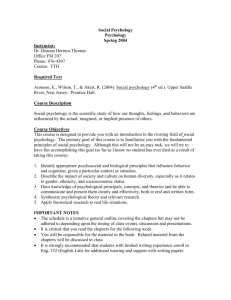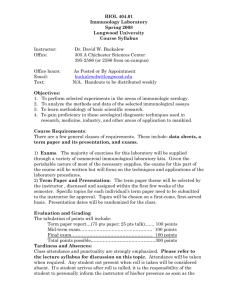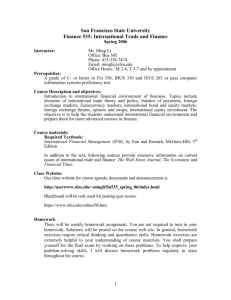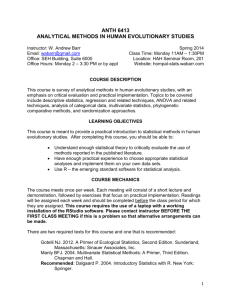PSY 101 13 FAUVER SP 11 (2)
advertisement
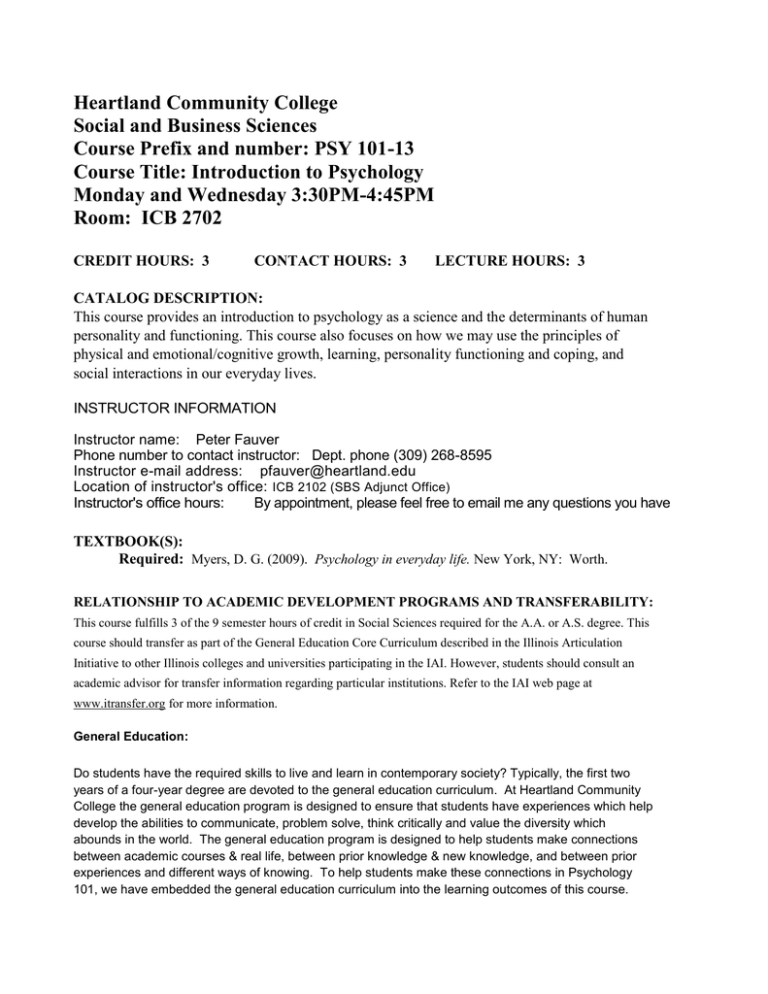
Heartland Community College Social and Business Sciences Course Prefix and number: PSY 101-13 Course Title: Introduction to Psychology Monday and Wednesday 3:30PM-4:45PM Room: ICB 2702 CREDIT HOURS: 3 CONTACT HOURS: 3 LECTURE HOURS: 3 CATALOG DESCRIPTION: This course provides an introduction to psychology as a science and the determinants of human personality and functioning. This course also focuses on how we may use the principles of physical and emotional/cognitive growth, learning, personality functioning and coping, and social interactions in our everyday lives. INSTRUCTOR INFORMATION Instructor name: Peter Fauver Phone number to contact instructor: Dept. phone (309) 268-8595 Instructor e-mail address: pfauver@heartland.edu Location of instructor's office: ICB 2102 (SBS Adjunct Office) Instructor's office hours: By appointment, please feel free to email me any questions you have TEXTBOOK(S): Required: Myers, D. G. (2009). Psychology in everyday life. New York, NY: Worth. RELATIONSHIP TO ACADEMIC DEVELOPMENT PROGRAMS AND TRANSFERABILITY: This course fulfills 3 of the 9 semester hours of credit in Social Sciences required for the A.A. or A.S. degree. This course should transfer as part of the General Education Core Curriculum described in the Illinois Articulation Initiative to other Illinois colleges and universities participating in the IAI. However, students should consult an academic advisor for transfer information regarding particular institutions. Refer to the IAI web page at www.itransfer.org for more information. General Education: Do students have the required skills to live and learn in contemporary society? Typically, the first two years of a four-year degree are devoted to the general education curriculum. At Heartland Community College the general education program is designed to ensure that students have experiences which help develop the abilities to communicate, problem solve, think critically and value the diversity which abounds in the world. The general education program is designed to help students make connections between academic courses & real life, between prior knowledge & new knowledge, and between prior experiences and different ways of knowing. To help students make these connections in Psychology 101, we have embedded the general education curriculum into the learning outcomes of this course. Course Learning Outcomes: Upon completion of this course, students will develop an increased proficiency in the following areas: Communication: 1. Be able to apply the many theories of psychology to real life. Diversity: 1. Understand, apply and communicate the major theoretical perspectives of psychology including biological, psychodynamic, social, behavioral, and cognitive views. Problem Solving: 1. Demonstrate awareness and appreciation of the history of science and research methods that have developed in psychology. Critical Thinking: 1. Understand, apply and communicate the major theoretical perspectives of psychology including biological, psychodynamic, social, behavioral, and cognitive views. 2. Be able to apply the many theories of psychology to real life. Other: 1. Understand the importance of neurobiology and physiology and its impact on human behavior and development. 2. Be able to identify and appraise various abilities, functions, failures, and pathology of human behavior and mental processes. 3. Have acquired an awareness and appreciation of various theories and factors related to developmental processes throughout the lifespan, and the role of testing to assess those processes. 4. Be able to identify and appraise how psychology research and theory can improve human functioning at all stages of life. COURSE OUTLINE: This outline is a brief representation of what each instructor will include while teaching this class. There may be additional material that is included; each instructor may vary the presentation of the topics as well as how much time is spent on each topic. 1. 2. 3. 4. 5. 6. 7. 8. 9. 10. 11. 12. Psychology's Roots Research Methods Neuroscience Consciousness Human Development Through The Lifespan Gender and Sexuality Sensation and Perception Learning Memory Thinking, Language, and Intelligence Motivation and Emotion Stress and Coping 13. 14. 15. 16. Personality Psychological Disorders Therapy Social Psychology METHOD OF EVALUATION (Tests/Exams, Grading System): Final grades will be determined according to the following scale: Exams 3 exams x 100pts each =300pts Quizzes 10 Quizzes x 10pts each =100pts Journals 10 Journals x 10 pts each =100pts =500 total points A >= 450pts B >= 400pts C >= 350pts D >= 300pts F< 300pts Exams will consist of multiple-choice questions and two essay questions. On the essay portion there will be three to four essay prompts from which you may choose two to answer. Quizzes will be posted on blackboard. These quizzes are a review of the reading and serve to inform your instructor of the class’s comprehension of the text. Quizzes are to be complete prior to the start of class. Journals are accessed on blackboard. Journal entries should be 290 – 310 words (one page). What to do when blackboard doesn’t work: Email your instructor (pfauver@heartland.edu). For journal assignments, simply include your journal in the text of the message. REQUIRED WRITING AND READING: Every instructor will require a minimum of 10 pages (equivalent to 10 typed, double spaced, pages) of writing from each student. This may be accomplished through a combination of various writing requirements such as: term papers, essay questions on exams, journaling assignments, writing within projects, reflective papers, or other written assignments. SYLLABI DISCLAIMER: The instructor reserves the right to change any and all assignments, rules or requirements in this class without prior notice. Students will be notified of any changes in assignments, rules or requirements at the earliest possible moment. Academic Support Center Services: Library The Library, located in the Student Commons Buildings at the Raab Road campus, provides Heartland students with a full range of resources including books, online journal databases, videos, newspapers, periodicals, reserves, and interlibrary loan. Librarians are available to assist in locating information. For more information, please call the Library (309) 268-8200 or (309) 268-8292 Tutoring Services Heartland Community College offers tutoring in various forms at no cost to Heartland students at the Tutoring and Testing Center in Normal and at the Pontiac and Lincoln Centers. Tutors are available at convenient times throughout the week. Study groups are also available by request. For more information about services available at each location, please call the Tutoring and Testing Center in Normal (309) at 268-8231, the Pontiac Center at (815) 842-6777, or the Lincoln Center at (217) 735-1731. Testing Services The Tutoring and Testing Center provides a secure testing environment for students who are enrolled in online, hybrid, and other distance learning courses; have a documented disability; or need to take a make-up exam. Testing accommodations for students having documented disabilities must be arranged by the student through the Office of Disability Services, and Testing Services will only administer makeup exams at the request of the instructor. Contact Testing Services at (309) 268-8231 for more information. Open Computing Lab The Open Computing Lab provides free computing for HCC students at convenient times throughout the week. The computer lab is staffed by trained Lab Assistants and offers the use of approximately 70 computers, a scanner, a laser printer, and an electric typewriter. Disability Support Services Heartland Community College offers Disability Support Services (DSS) with offices located in the Academic Support Center. DSS ensures that students with disabilities have equal access to the college’s programs, services and activities through the provision of reasonable accommodations as outlined in Section 504 of the Rehabilitation Act and the Americans with Disabilities Act. DSS offers a wide range of services to support students with disabilities, including: assistive technology, document conversion services, personnel, classroom and testing accommodations. Students with a documented disability who wish to discuss academic accommodations can contact disability support services at (309)268-8259. Academic Integrity and Plagiarism Academic Integrity Academic integrity is a fundamental principle of collegial life at Heartland Community College and is essential to the credibility of the College’s educational programs. Moreover, because grading may be competitive, students who misrepresent their academic work violate the right of their fellow students. The College, therefore, views any act of academic dishonest as a serious offense requiring disciplinary measures, including course failure, suspension, and even expulsion from the College. In addition, an act of academic dishonesty may have unforeseen effects far beyond any officially imposed penalties. Violations of academic integrity include, but are not limited to cheating, aiding or suborning cheating or other acts of academic dishonesty, plagiarism, misrepresentation of data, falsification of academic records or documents and unauthorized access to computerized academic or administrative records or systems. Definitions of these violations may be found in the college catalog. Plagiarism Plagiarism is the presenting of others’ ideas as if they were your own. When you write a paper, create a project, do a presentation or create anything original, it is assumed that all the work, except for that which is attributed to another author or creator, is your own. Plagiarism is considered a serious academic offense and may take the following forms: • Copying word-for-word from another source and not giving that source credit. • Paraphrasing the work of another and not giving that source credit. • Adopting a particularly apt phrase as your own. • Using an image or a copy of an image without crediting its source. • Paraphrasing someone else’s line of thinking in the development of a topic as if it were your own. • Receiving excessive help from a friend or elsewhere, or using another project as if it were your own. [Adapted from the Modern Language Association’s MLA Handbook for Writers of Research Papers. New York: MLA, 1995: 26] Note that word-for-word copying is not the only form of plagiarism. The penalties for plagiarism may be severe, ranging from failure on the particular piece of work, failure in the course or expulsion from school in extreme cases. On-Line Course Evaluations On-line course evaluations are completed during the last three weeks of class by selecting the link in your myHeartland account. Philosophy of Grades The Heartland Community College grading philosophy grows out of our vision of educational excellence. This common philosophy provides a framework for each academic division and instructor as they establish their own individual course grading system, evaluation methods, and course policies using the shared general rubrics for letter grades given below. Letter grades serve as a vehicle to promote meaningful evaluation of student achievement, to inform students of academic progress, and, as necessary, to improve student performance, habits, and practices. Using a letter grade as a prerequisite for subsequent courses means we believe that the grade was assigned through a conscious judgment about a student’s readiness to proceed to more advanced study. At Heartland, students’ academic achievement is measured by their mastery of course objectives and content. We challenge students to meet these recognized standards of achievement and we assign grades based on their success in doing so. Simply stated, we believe that the responsibility for academic achievement rests with the student and that holding students responsible for their learning promotes their academic growth. Letter Grade Rubrics “A” This grade represents consistently outstanding performance that demonstrates superior understanding and skillful use of important course concepts. Performance at this level signifies that the student is extremely well prepared to continue with more advanced study of the subject. “B” This grade represents performance significantly beyond the level necessary to achieve the course objectives. Work is of high quality but not consistently at an outstanding level. Performance at this level signifies that the student is well prepared to continue with more advanced study of the subject. “C” This grade represents an acceptable achievement of the course objectives. Performance at this level signifies that the student is reasonably well prepared to continue with more advanced study of the subject. “D” This grade represents less than adequate performance. It signifies questionable readiness to proceed with more advanced study of the subject. “F” This grade reflects unacceptable performance. The student is not yet ready to proceed with more advanced study of the subject, and must repeat the course successfully to receive credit. Course Calendar Monday Wednesday Jan 10 Chapter 1 Journal MLK Day Jan 12 Chapter 2 Journal Chapter 3 Jan 26 Chapter 4 Journal Chapter 5 Complete Quiz BEFORE class Chapter 6 Complete Quiz BEFORE class Chapter 7 Complete Quiz BEFORE class Spring Break Feb 9 Mar 17 Mar 21 Lab Journal Chapter 8 Mar 24 Chapter 8 Complete Quiz BEFORE class Chapter 9 Mar 28 Chapter 9 Mar 31 Exam 2: Chapters 5-9 Apr 4 Apr 6 Apr 11 Chapter 10 Complete Quiz BEFORE class Chapter 11 Apr 18 Chapter 12 Apr 20 Apr 25 Chapter 13 Complete Quiz BEFORE class Chapter 14 Journal Apr 27 Chapter 10 Journal Chapter 11 Journal Chapter 12 Journal Chapter 13 May 4 Chapter 14 Jan 17 Jan 24 Jan 31 Feb 7 Feb 14 Feb 21 Feb 28 Mar 7 Mar 14 May 2 May 11 2:00 PM FINAL EXAM Jan 19 Feb 2 Feb 16 Feb 23 Mar 3 Mar 10 Apr 13 Chapter 1 Complete Quiz BEFORE class Chapter 2 Complete Quiz BEFORE class Chapter 3 Complete Quiz BEFORE class Chapter 4 Complete Quiz BEFORE class Exam One: Chapters 1-4 Chapter 5 Journal Chapter 6 Chapter 7 Journal Spring Break
